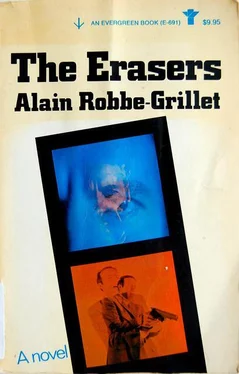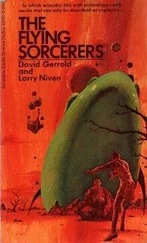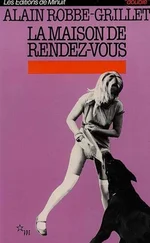Alain Robbe-Grillet - The Erasers
Здесь есть возможность читать онлайн «Alain Robbe-Grillet - The Erasers» весь текст электронной книги совершенно бесплатно (целиком полную версию без сокращений). В некоторых случаях можно слушать аудио, скачать через торрент в формате fb2 и присутствует краткое содержание. Жанр: Криминальный детектив, на английском языке. Описание произведения, (предисловие) а так же отзывы посетителей доступны на портале библиотеки ЛибКат.
- Название:The Erasers
- Автор:
- Жанр:
- Год:неизвестен
- ISBN:нет данных
- Рейтинг книги:4 / 5. Голосов: 1
-
Избранное:Добавить в избранное
- Отзывы:
-
Ваша оценка:
- 80
- 1
- 2
- 3
- 4
- 5
The Erasers: краткое содержание, описание и аннотация
Предлагаем к чтению аннотацию, описание, краткое содержание или предисловие (зависит от того, что написал сам автор книги «The Erasers»). Если вы не нашли необходимую информацию о книге — напишите в комментариях, мы постараемся отыскать её.
The Erasers — читать онлайн бесплатно полную книгу (весь текст) целиком
Ниже представлен текст книги, разбитый по страницам. Система сохранения места последней прочитанной страницы, позволяет с удобством читать онлайн бесплатно книгу «The Erasers», без необходимости каждый раз заново искать на чём Вы остановились. Поставьте закладку, и сможете в любой момент перейти на страницу, на которой закончили чтение.
Интервал:
Закладка:
Yet nothing has happened yet today. Time is passing quite normally. Dupont is calmly waiting for the car the minister promised. As the time set for Dupont’s departure approaches, the little doctor’s confidence increases despite himself.
But now he is afraid that this Wallas-who needed him?-might spoil everything at the last minute; he is anxious about this delay that nothing in the special agent’s insistence a half-hour ago could have suggested. Juard could take advantage of it to get away without seeing him, particularly since his professional obligations do not allow him to stay here until tonight; but he cannot make up his mind to leave: the policeman might arrive from one minute to the next, and if he sees no one at the rendezvous he will go back to the Rue de Corinthe-which must be avoided at all costs.
The little doctor continues to walk back and forth between the snack bar and the telephones, five steps in one direction, five steps in the other. He does not know which side to take…he stops a moment. He glances at his watch-although he had seen the time on the big clock scarcely twenty seconds before. He sets limits beyond which he will wait no longer; but he exceeds them, one after the other-and still does not leave.
To the left of the clock is posted a sign a foot and a half high in red capital letters:
DO NOT BLOCK EXIT
Symmetrically posted, a slogan in blue letters on a yellow background: “Don’t Leave Without Taking The Times.”
All at once Juard decides someone is playing tricks on him; this notion strikes him with such violence that it gives him an almost physical sensation, analogous to that afforded by a misstep that causes a sudden loss of balance.
The man named Wallas doesn’t care about being on time at this absurd rendezvous: it’s the clinic he’s interested in! He is there at this very moment, busily rummaging through everything; since he has a search warrant, no one dares say a thing. By choosing this unexpected spot-the station-Juard has only reinforced the special agent’s suspicions, while giving free rein to his curiosity.
Perhaps there is still time to keep Dupont from being discovered. Juard has not a minute to lose. While he is crossing the hall, he thinks of a way to arrange matters, when a new cause for alarm strikes him: this Wallas is a phony policeman, he’s looking for the professor in order to kill him
The little doctor stops short in order to think.
He is in front of the newsstand, whose wares he pretends to be examining. Don’t leave without taking The Times. He steps forward on the pretext of buying the evening edition.
A customer, bending over the counter, straightens up an(steps back a little to make room for Juard in front of the tiny stand; then he exclaims:
“Oh, Doctor!” he says, “I was looking for you.”
Doctor Juard has now described for the third time the discovery of the burglar in the study, the revolver shot, the “flesh wound,” and death on the operating table. He knows his story by heart by this time; he is aware of repeating it more naturally than he did this morning in the commissioner’s office; and when he is asked an additional question, he furnishes the requested detail without difficulty, even if he improvises. This fiction has gradually assumed enough weight in his mind to dictate the right answers to him automatically; it continues of its own accord to secrete its own details and hesitations-just as reality would, in such circumstances. Juard is not far, at moments, from being taken in himself.
His interlocutor is not trying, moreover, to complicate his task. He furnishes the next clue appropriately: it is obvious that he is already accustomed to this version of the facts and does not dream of contesting it.
“Could you suggest from approximately what distance the shot was fired?”
“About five or six yards; it’s difficult to give an exact figure.”
“The bullet penetrated the body from in front?”
“Yes, directly in front, between the fourth and fifth ribs. For a bullet fired by a man running away, it was skillfully aimed.”
“There was no other wound, was there?”
“No, just the one.”
The dialogue moves along easily-so easily that it becomes almost disturbing, like the overly cunning camouflage of a trap. Juard wonders if Wallas does not know more than he is admitting.
Isn’t it obvious, in fact, that the special agent knows the whole truth? He wouldn’t have been transferred from the capital for just a burglary. Then what is he trying to get out of the doctor? The latter cautiously asks a few indirect questions to try to find out if it is really necessary to continue this farce; but Wallas remains immured in their original conventions, neither because he feels they are more certain or because he has not understood the signals of complicity Juard has made to him, or else for still other reasons.
The little doctor would especially like to know what kind of protection he can count on from the police. Despite the misunderstanding that burdens their conversation, he has a certain sympathy for Wallas; but he does not have the impression that his help could be very effective in dealing with so powerful an organization. He does not even wear a uniform. As for the men from the police station, though they have more apparent prestige, Juard is too close to them not to know how much he can expect from them and what he can count on there.
The relative confidence Wallas inspires in him still does not keep him from staying on the defensive: the so-called “special agent” may also be in the other man’s pay.
On the other hand, it is not impossible that his sincerity is so complete that he doesn’t even know what has really happened.
Juard returns to his clinic. He has been able to obtain neither information nor promises from Wallas. He has less and less hope of any possible help from the authorities, were things to go badly. They would be quicker to condemn him as an accomplice.
Whichever way he turns, he is just as guilty. The issue, as he sees it, is inevitably a fatal one.
Given these various dangers, the special agent, who at first inspired him with unexpected fears, now seems on reflection much less dangerous, if not exactly a savior. Juard is even about to reproach himself for his own suspicions: shouldn’t he have told the truth-of which Wallas certainly seems, after al basically ignorant…
But the little doctor then remembers the last words he spoket as he was leaving: “Sometimes you go through hell and high water to find a murderer…” He has immediately regretted them, for they applied all too clearly-much more clearly than he had planned-to the present situation. Now he is pleased at having spoken them. Wallas, thanks to him, now possesses the key to the riddle; if he considers it carefully and knows how to deal with what he finds, he will not be following a false lead. However, Juard has not felt that the special agent paid particularly close attention to his last words.
Back in the Rue de Corinthe, the doctor is going to rejoin Daniel Dupont in the little white room. As is customary in the clinic, he walks in without knocking. The professor, who has his back to the door, starts when he hears him.
“You frightened me.”
“I’m sorry,” Juard says, “I came in as if this were my own room. I don’t know what I was thinking of.”
Dupont must have been walking back and forth between the bed and the window. He looks annoyed.
“How’s the arm?” Juard asks.
“Fine, just fine.”
“Any fever?”
“No, none. I’m all right.”
“It would be better not to move around too much.”
Dupont does not answer. He is thinking about something else. He walks over to the window, pulls aside one of the curtains-only an inch or so-so as to look out into the street without being seen.
Читать дальшеИнтервал:
Закладка:
Похожие книги на «The Erasers»
Представляем Вашему вниманию похожие книги на «The Erasers» списком для выбора. Мы отобрали схожую по названию и смыслу литературу в надежде предоставить читателям больше вариантов отыскать новые, интересные, ещё непрочитанные произведения.
Обсуждение, отзывы о книге «The Erasers» и просто собственные мнения читателей. Оставьте ваши комментарии, напишите, что Вы думаете о произведении, его смысле или главных героях. Укажите что конкретно понравилось, а что нет, и почему Вы так считаете.












